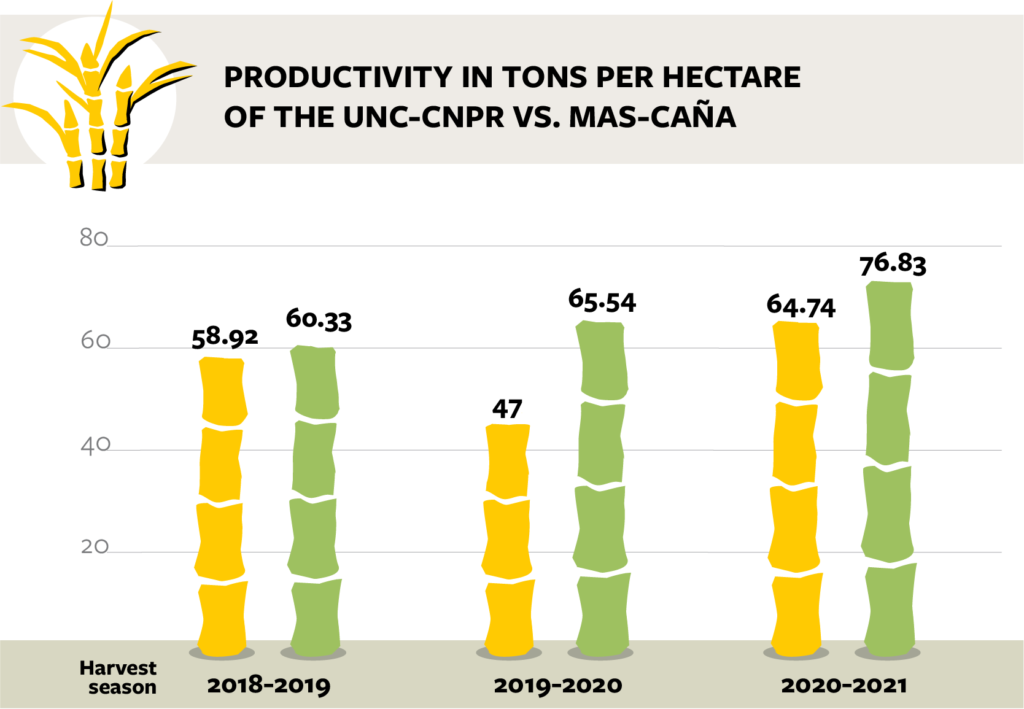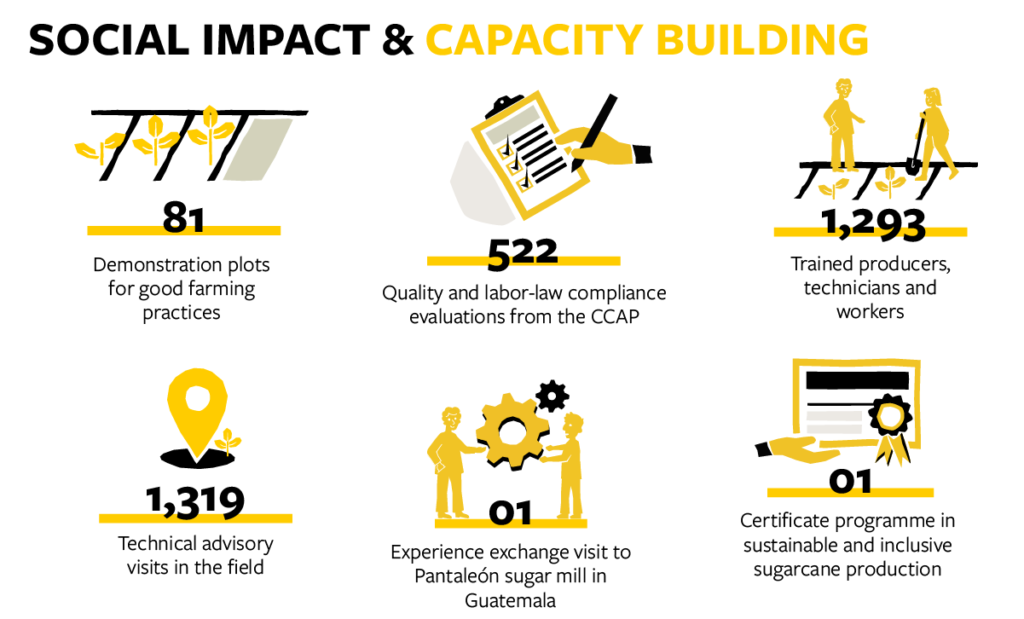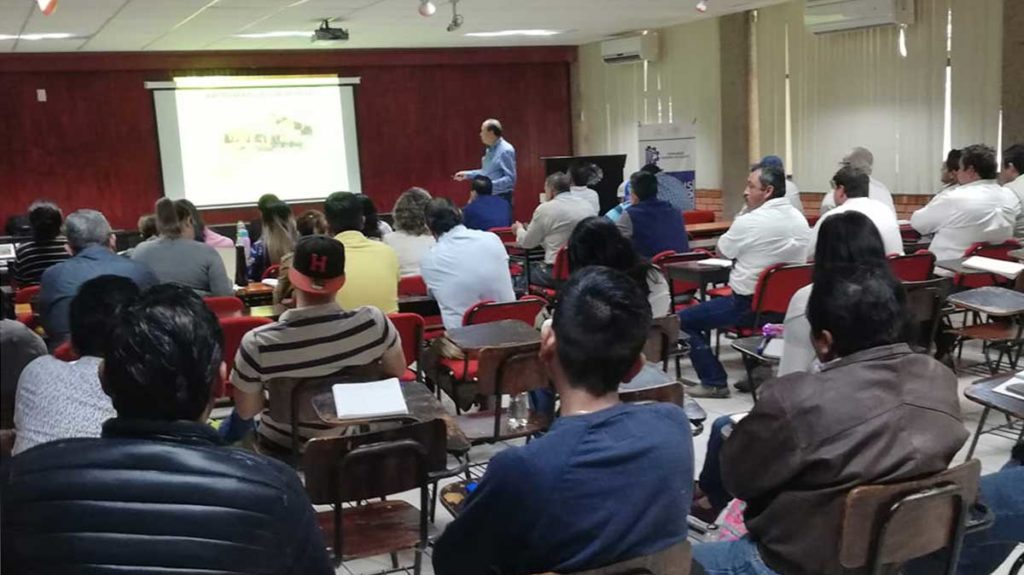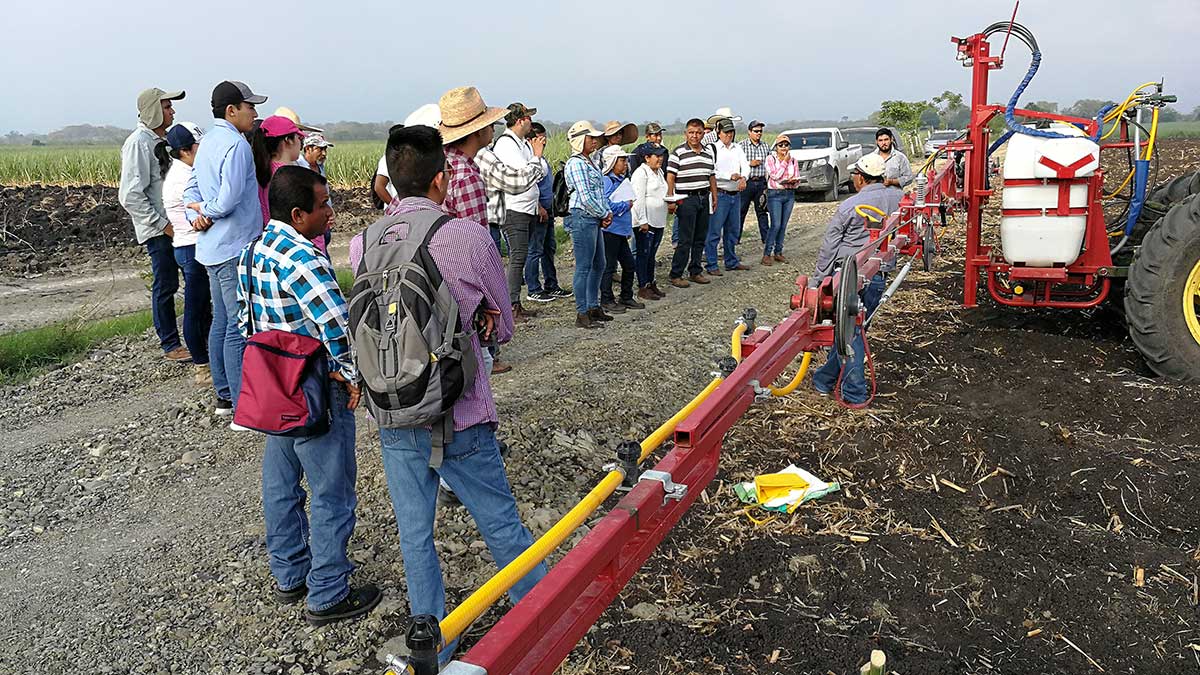Over 1,200 producers and workers strong
The MAS-CAÑA pilot programme ended in August 2021 with 1,275 smallholder farmers adopting and implementing best practices in sugarcane production. The project relied on more than 5,000 hectares of demonstration plots to model and validate good practices, and strengthen the participants’ skill set through a learning-doing methodology.
The pilot project resulted in a 21.50 percent increase in productivity for participating producers. Compared to the 60.33 tons/hectare harvested in 2018/2019, participants harvested 76.83 tons/hectare in 2020/2021 in spite of the drought conditions in the area.
As the graph shows, MAS-CAÑA participants exceeded the productivity of other National Union of Cane Growers (UNC-CNPR) producers. The global average for all sugar mill producer associations was 55.22 tons/hectare across the three harvests.

Sugarcane smallholders adopt practices with greater impact
First hand experiences were an important part of the pilot programme. Participants traveled to a sugar mill in Guatemala for an exchange where they were able to directly observe how mechanized harvesting and good practices increased yields and productivity. The trip was a catalyst that shifted the mentality of the Mexican producers. From then, they were more willing to attend trainings, and were able to identify the practices with the greatest potential impact for their own farms. The sessions allowed them to observe, implement and validate practices that helped them to make better use of resources, reduce costs and protect their workers and the soils where sugarcane is grown.

The MAS-CAÑA pilot resulted in a cohort of producers, technicians and workers in Mexico’s sugar sector that are now more resilient to climate change thanks to their adoption of sustainable practices.
Participants were also able to reduce weed control costs. One producer, in particular, decreased their costs per day by 42%, from USD1.00 to USD0.58 per day. They achieved this cost reduction through best practices learned and implemented in training, including:
- The timely use and application of pre-emergent and post-emergent herbicides,
- dosage of chemical herbicides depending on the soil type and weed type,
- water hardness and pH correction,
- application equipment calibration, and
- nozzle selection.
The pilot project conducted 552 quality and labor-law compliance evaluations through the initiative Quality and Agricultural Conformity for Producers (CCAP), a system for measuring and recording the effectiveness of best practices by validating with quality indicators established in consensus with the producer representatives.
Comprehensive training for a sugarcane community
MAS-CAÑA also benefited the surrounding community in Ciudad Valles by introducing a certificate programme, “Efficient, sustainable and inclusive sugarcane production” on offer in the local vocational college. The programme was developed in collaboration with Bayer, Coca-Cola and the National Technological Institute of Mexico, Ciudad Valles Campus. The participants then graduated with a certificate that validated and made the acquired knowledge more visible.
“We hope that this achievement motivates participants to focus on generating innovative solutions and creating strategies that contribute to improving their economy through sustainable practices in sugarcane.”
Joel García, PanameriCaña Agricultural Manager for Solidaridad
The certificate course prepared the participants for a generational change and also encouraged the Technological Institute officials to reinstate the agronomic engineering major, which was previously suspended, despite the fact that sugarcane is a primary source of income in the area.

The next steps for MAS-CAÑA
After this highly successful pilot, with more than 1,400 technical advisory visits in the field, Solidaridad’s PanameriCaña team is now in the development stage of the programme that will reach more than 3,500 smallholder producers on 30,000 hectares of sugarcane production in Veracruz, Mexico. Bayer, Pantaleon Group and Solidaridad signed the collaborative agreement in September 2021 to move the programme forward.
“Solidaridad and PanameriCaña focus on priority issues such as employing integrated systems and technologies that help reduce negative environmental impacts and promote prosperity for smallholders. It is a great honor for us to enter into a new partnership with visionary companies such as Bayer and the Pantaleon Group to expand the MAS-CAÑA programme. Together, we are contributing to developing a sugarcane value chain that uses sustainable practices to protect soil, water, air and biodiversity and that positions smallholders as entrepreneurs who make the right decisions to increase their productivity.”
-Carlos García Valdez, PanameriCaña Regional Manager for Solidaridad.
Interested in supporting our efforts to boost the resilience of the region’s sugarcane sector? Learn more about our work through PanameriCaña or the MAS-CAÑA programme by connecting with Carlos García Valdez on LinkedIn.

